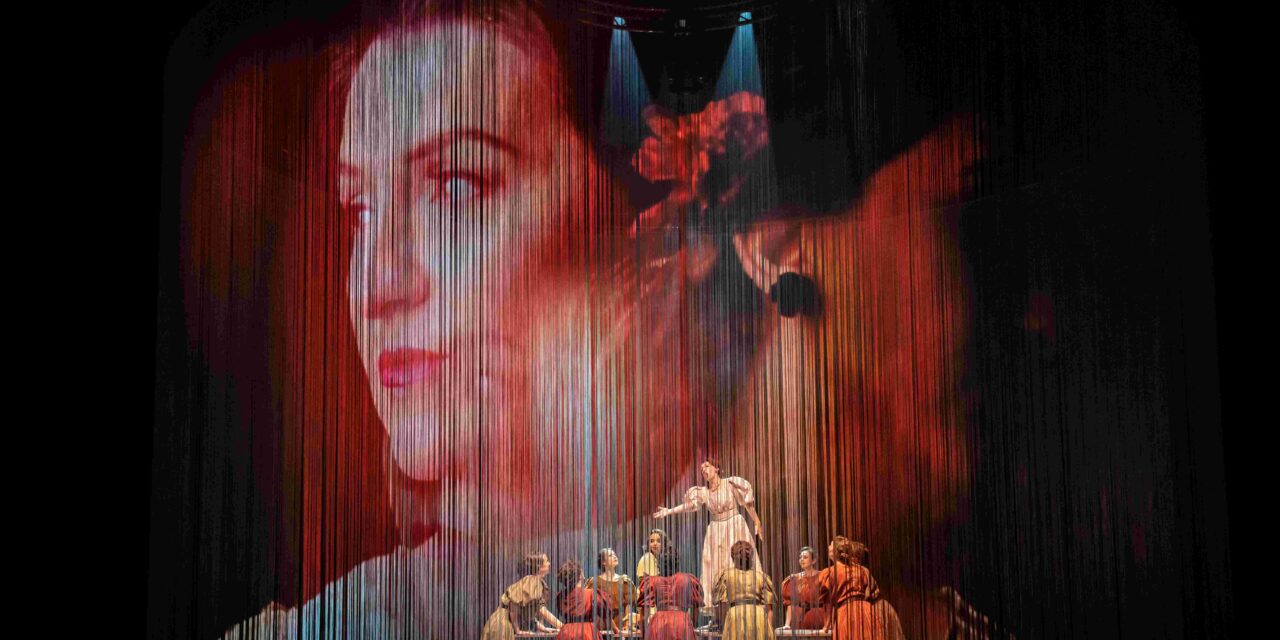
17 October
Osvaldo Golijov’s Ainadamar is based on the life and martyrdom of the poet and playwright Federico Garcia Lorca whose politics and sexuality led to him being assassinated in 1936 just one month into the Spanish Civil War.
This bold production by Welsh National Opera is acclaimed choreographer Deborah Colker’s operatic debut and, as the person behind the Rio 2016 Olympics ceremony, it is unsurprisingly a flamboyant one. Ainadamar is the place in Granada where Lorca and later thousands more were murdered. It is the Arabic name for Fountain of Tears and staging is centred around a circular space reminiscent of a fountain and like nothing usually seen on an operatic stage. A series of cinematic images and slogans are projected on the mantle-like surface within which an increasingly imaginative set is constructed.
Sung in Spanish, Ainadamar is deeply exhilarating, part passion play, part video nasty and an altogether invigorating piece of theatre which fuses traditional operatic flourishes, flamenco, and modern electronic music. The combination of Latin American, Eastern and Andalusian influences along with modern musical and voice sampling is a heady mix, and not for the fainthearted. A sense of menace pervades the entire 80 minutes as Lorca’s life is reimagined through flashbacks of memories by his muse Margarita Xirgu, the actress who appeared in his first successful play. The character she played, Pineda, was herself murdered as reward for her revolutionary zeal and was a lifelong inspiration for the equally tragic Lorca.
Margarita (Jaquelina Livieri) seeks to pass on her own generation’s hopes to her student Nuria (Cardiff Singer of the World 2023 Prize winner Julieth Lozano Rolong). The trio of international female voices is completed with mezzo-soprano Hanna Hipp as Lorca himself.
A strong opening featuring images of rampant bulls dissolves to reveal a male flamenco dancer strutting his stuff. The chorus sing ‘what a sad day it was in Granada; the stones began to cry’ while Margarita recounts her adoration for dead Lorca as she once more prepares to appear as Pineda. As the fascist regime takes hold, embodied by sinister Andalusian flamenco singer Alfredo Tejada as Falangist politician Ruiz Alonso, she shares her guilt at not being able to persuade Lorca to flee his native Granada. We later learn that Margarita herself is dying, but she knows that although an actor’s performance is short, the cause of freedom will never die.
As is expected with the WNO, we are treated to superb orchestration, again under the direction of conductor Mathew Kofi Waldren, but this production takes opera a little further. We move into a heady realm of richly colourful spectacle, a fusion of dance and intoxicating tableaus to tell Lorca’s story.
And despite the excellence of the musical score and singing, it is dance that drives the dynamic, pushing boundaries just as Lorca himself did in his life, with scenes of visceral exoticism and eroticism. If this is the future of opera, then bring it on.
★★★★☆ Bryan J Mason 18 October 2023
photographers credit @ Johan Persson


